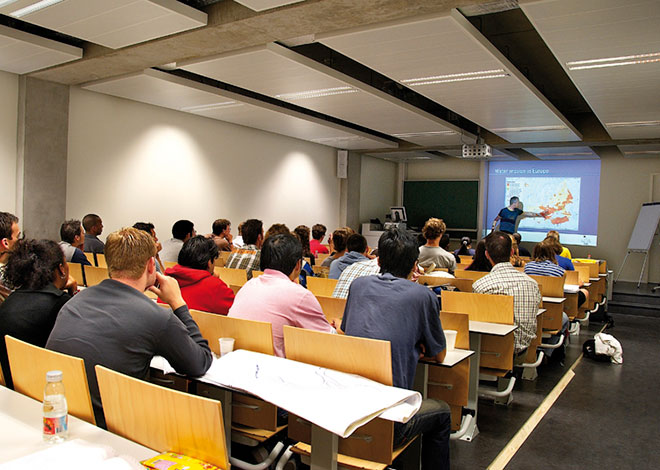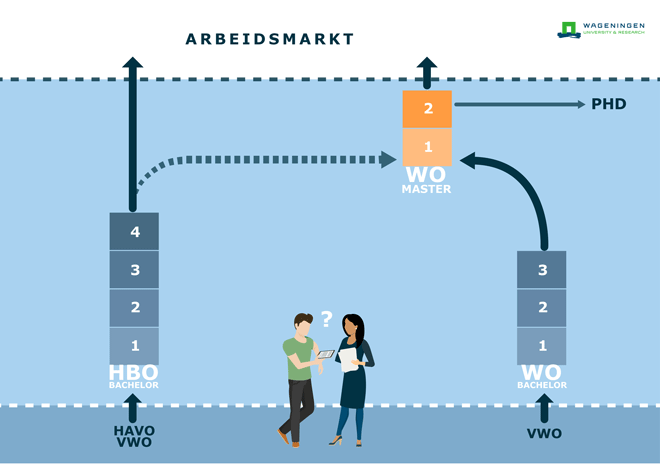Master’s choice : another real study choice
Your choice of Master’s programme is another real study choice. The essential questions a student must ask before making a choice: Who am I, what kind of work suits me, what motivates me, who do I want to be in the future, and – very important – who can help me with that. Master’s choice : another real study choice.

The structure of a university study programme
A complete university study programme consists of two parts: a Bachelor’s programme and a Master’s programme. These are two full-scale study programmes. Both study programmes are concluded with a thesis, your own research about which you also write a report or article. A full-scale university study programme also concludes with two diplomas: a Bachelor’s diploma and a Master’s diploma. During the Bachelor’s phase, students learn the basics of their future profession and the basic scholarly knowledge applicable to that school of thought. They then put that into practice during the Master’s phase. Part of the Master’s programme is a work placement.
Your Master’s choice
The Master’s programme can be fully aligned with the Bachelor’s programme: you complete a Bachelor’s programme in Biotechnology and then a Master’s programme in Biotechnology. But a student could also discover that he has a strong interest in plants and really wants to specialise in that. That is also possible. The student can then choose to pursue a Master’s in Plant Biotechnology. Another student could discover that she actually has a strong interest in a whole other field. She can also pursue a Master’s degree in that field, under certain conditions. Master’s choice is then definitely another real study choice.
Why is a Master’s choiceso complicated?
A university Bachelor’s programme is a three-year programme. The first year is quite fixed: that is the foundation. You can earn 60 credits. To be allowed to continue with your study programme, you must earn a certain minimum number of credits, resulting in the Binding Study Advice. Students get more freedom in the second year, and much more in the third year. They can increasingly pursue their own interests. Students can even complete a minor in an entirely different field.
Students continue growing throughout this period. Sometimes that leads to a different vision of the future, and other times a student just wants to go in another direction.
You can change
You can choose a Master’s programme that leads you in a very different direction. Your Master’s choice could involve a Master’s programme at another university, or even in another country. Of course, students must meet the admissions requirements of the programme they wish to pursue. You cannot just choose any Master’s programme. Students can use the free choice portion of their Bachelor’s programme to prepare for the Master of their choice. They enjoy that. No one likes feeling ‘pinned down’ to choices they made as teenagers.
So it is really smart to attend a Master’s Open Day if you want take another look at what really suits you. We encourage students to compare various Master’s programmes and institutes. Would the student like you, the parent, to come along? Then do! You are welcome to attend our Master’s Open Days.
How do you choose a Master’s programme?
The Master’s programme trains you to become an expert. But this should also fit with who you are. Fortunately, students have allies in this process. The study adviser is the professional who can guide you through this choice process. In the last year of their Bachelor’s programme, students often contact this person. Together you can create a study programme that really fits your needs.
I first studied Arabic languages. But while I was doing a work placement in the Middle East, I became fascinated by water management and irrigation. I am going to pursue a Master’s degree in that direction. I couldn’t do that at my own university; I had to go to another university in another city. I also had to take a lot of extra courses, but it was worth it to me. Luckily, my parents supported my choice, because I found it extremely difficult to make this shift. Joost
Your Master’s choice? Good comparison is again important
Just as they did when choosing a Bachelor’s programme, students must go through the entire process again. It is a good idea to closely compare various Master’s programmes. Contact with the university of your choice is also extremely important. Consider talking with senior students, lecturers and study advisers. But comparing programmes online is also important. Take a look at comparison sites for Master’s programmes.
Parents are also important
More and more students are also asking their parents for advice. I often ask how that goes. As a parent, you probably have no insight into the subject of your child’s studies. But students still say that they like to get feedback from you.
My parents went with me to the Master’s Open Day, and I thought that was really nice. They can see whether I have doubts or whether I find it just totally amazing. Jantine
They like it when you ask smart questions. Actually, they are the same questions you asked when choosing a secondary school. Who are you, what kind of work suits you, what motivates you, who do you want to be in the future, and … who can help you with that. These are very theoretical questions, but you can make them more concrete.
Master’s choice only at the university?
Choosing a Master’s programme is not just an option for university students. Students who earned a Bachelor’s degree from a university of applied sciences can also pursue a university Master’s degree. You can, of course, start working, but you can also continue studying. Then it is certainly important to choose a Master’s programme in time and to make timely contact with that chosen programme. Often, students from a university of applied sciences can use the free choice portion of their study programme to take preparatory courses for the Master’s programme. Otherwise, they must complete extra courses (a pre-Master) before they are admitted.
See the diagram below for paths to a Bachelor’s or Master’s degree. (arbeidsmarkt is Dutch for labour market)

There are also Master’s programmes offered at universities of applied sciences, but these are usually aimed at students who have already worked several years in the field.
A Master’s programme can take one, two or three years, depending on the subject.
Do not choose a Master’s programme on your own
Do not make your Master’s choice on your own; you need help. Help from your study adviser, your fellow students, your friends… It is striking that more and more students are also asking their parents for advice. I often hear: ‘They know me the best’. That is a real compliment for today’s parents.
Gap year
You cannot start your Master’s programme until you have finished your Bachelor’s programme. For instance, if you finish the final courses for your Bachelor’s programme in October, you may have to wait until September before you can start your Master’s programme. Some students are also unsure about which Master’s choice they should make, or they may want to take a ‘study break’. Those students take a gap year to do something entirely different.
I finished my Bachelor’s programme and am now helping to organise the introduction days. That involves a lot of plans, reflection and fine-tuning together. I’m learning a lot from this. In the meantime, I am also taking the time to think carefully about my choice of Master’s programmes. Julia
From parental responsibility to parental involvement
As a parent, you have certainly noticed how your son or daughter has grown tremendously during their time at university. The relationship with your child will also have changed. If all goes well, you are now more of a coach than a ‘caregiver’. The responsibility for your child is over; he or she is now responsible for his or her own studies and life. But, hopefully, the involvement with your child remains.

